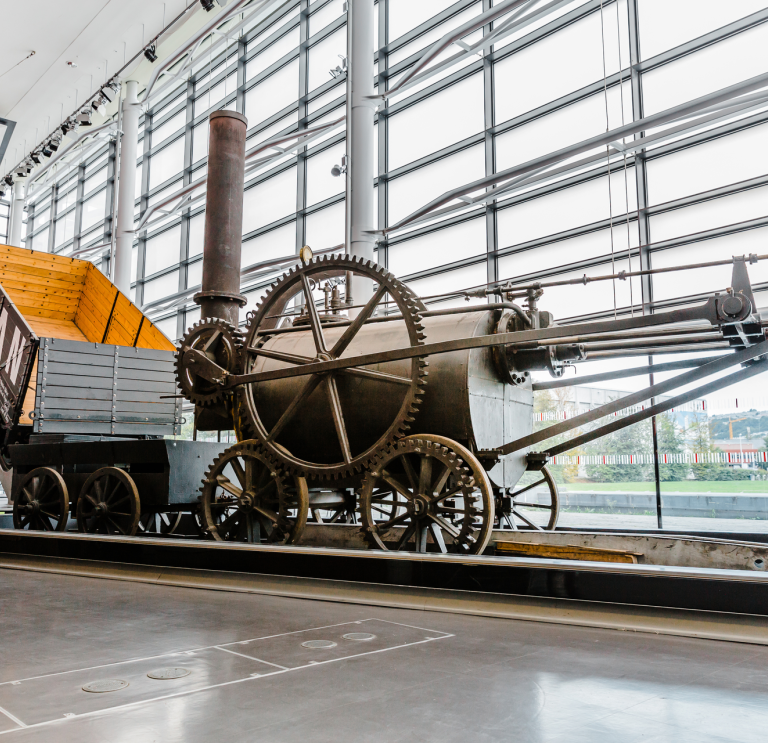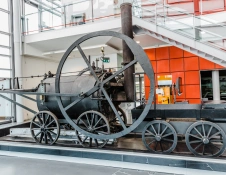With a variety of seasonal events and exhibitions on offer, no two visits are ever the same. And best of all, while some charges may apply for some of these aspects, and for parking, entry to these amazing places is free.
Discover our National Museums across Wales
National Museum Cardiffnational-museum-cardiff
Housed in our capital’s neo-classical Civic Centre, National Museum Cardiff covers a lot of ground beneath its handsome Edwardian dome. The Evolution of Wales exhibits take visitors from the Big Bang to the present day, with dinosaurs and woolly mammoths along the way. Upstairs, one of Europe’s finest art collections is especially strong on Impressionists and Post-Impressionists. Every two years, it’s also home to the UK’s richest art prize, Artes Mundi; the last one ran from October 2023 to March 2024.
Alongside the permanent exhibits, the museum hosts a changing selection of temporary exhibitions and events, including after dark science shows, dino sleepover's and silent disco's. Check the National Museum website to find out what’s on before your visit.



St Fagans National Museum of Historyst-fagans
The most popular heritage attraction in Wales - voted the UK's top museum by Which? Magazine members for the third year running - St Fagans Museum of National History, located 4 miles west of Cardiff city centre, is an immersive exploration of Welsh life through the ages. The big draw is outside in the parkland, where more than 40 original historic buildings have been reassembled, including farms, shops, a terrace of miners’ cottages, a workingmen’s institute, pub, woollen mill, bakehouse and 12th century church. The indoor galleries recently had a £30 million makeover, along with a new Gweithdy (workshop) for craft displays and activities. It’s also well worth exploring the beautiful formal gardens of St Fagans Castle, a 16th century manor house.


Big Pit National Coal Museumbig-pit
Go deeper (literally) into our industrial heritage at Big Pit National Coal Museum. Located in Blaenavon, in the county of Newport, Big Pit is a living, breathing tribute to the coal industry and the society it created. The highlight (or should that be lowlight considering how dark it can be down there!) is the underground tour, where you’ll travel 90m below the earth to explore the workings of this former coal mine. There’s lots to see on the surface too, including the pithead baths and the massive winding engine that lifted coal and miners up from the depths for more than 50 years. It’s all set in a unique industrial landscape that is designated by UNESCO as one of Wales' four World Heritage Sites.


National Roman Legion Museumnational-roman-legion-museum
In AD75, the Romans built a fortress at Caerleon, Newport, that would guard this region for 200 years. The National Roman Legion Museum, sits on the site of one of only three permanent fortresses the Romans built in Britain, with impressive remains that include the UK’s most complete amphitheatre, baths and the only surviving Legionary barracks on view anywhere in Europe.



National Waterfront Museumnational-waterfront-museum
For a dive into our industrial history, head to the National Waterfront Museum in Swansea. The centrepiece of the city’s Maritime Quarter, this hi-tech museum celebrates the mining, metal-working and transport technologies that changed the face of Wales, without forgetting the very human stories behind all that dazzling innovation. There are plenty of fascinating relics from the Industrial Revolution, and big new ideas on how Welsh science is shaping the future.

National Wool Museumnational-wool-museum
There are three times as many sheep as people in Wales, and the woollen industry was the heartbeat of our rural economy from medieval times. The friendly National Wool Museum, set in the old Cambrian Mills in the Teifi valley, Carmarthenshire, demonstrates the fascinating process of Welsh wool from fleece to fabric – which went into making everything from shirts and shawls to blankets and bedcovers, cardies and carpets.



National Slate Museumnational-slate-museum
The Dinorwig Quarry was at the heart of a North Wales slate industry that once employed 17,000 workers. Our National Slate Museum, located in Llanberis, within the Padarn Country Park, tells the gripping story of how slate changed the landscape and people. It’s largely staffed by ex-quarrymen, who bring the whole story vividly to life and show off their considerable slate-splitting skills.









